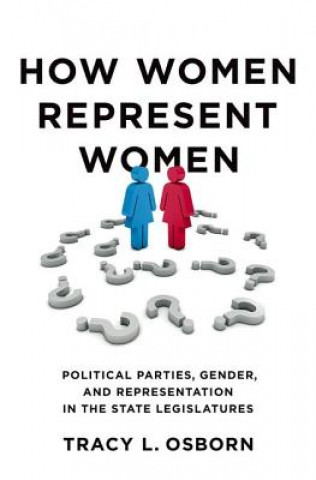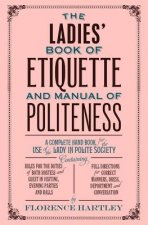
Kód: 01324363
How Women Represent Women
Autor Tracy L Osborn
Though the number of women elected to the U.S. state legislatures has grown substantially in the last forty years, researchers still struggle to connect women's presence in the legislature to public policy outcomes that affect wom ... celý popis
- Jazyk:
 Angličtina
Angličtina - Vazba: Pevná
- Počet stran: 256
Nakladatelství: Oxford University Press Inc, 2012
- Více informací o knize

Mohlo by se vám také líbit
-

Zbinden's Progress
402 Kč -

All This Stuff
915 Kč -

John Calvin, a Pilgrim's Life
403 Kč -

Hokejisti a králíci
52 Kč -

Bleach 7
171 Kč -

13 hodin
293 Kč -

Matematika 8 Aritmetika Pracovní sešit
94 Kč
Dárkový poukaz: Radost zaručena
- Darujte poukaz v libovolné hodnotě a my se postaráme o zbytek.
- Poukaz se vztahuje na celou naši nabídku.
- Elektronický poukaz vytisknete z e-mailu a můžete ihned darovat.
- Platnost poukazu je 12 měsíců od data vystavení.
Více informací o knize How Women Represent Women
Nákupem získáte 475 bodů
 Anotace knihy
Anotace knihy
Though the number of women elected to the U.S. state legislatures has grown substantially in the last forty years, researchers still struggle to connect women's presence in the legislature to public policy outcomes that affect women. One reason for this struggle is that we lack a complete understanding of how political parties modify the relationship between women legislators' interests in representing women and the creation of public policies affecting women. In How Women Represent Women: Political Parties, Gender and Representation in the State Legislatures, Tracy L. Osborn examines the two avenues through which political parties fundamentally affect the ways in which partisan women legislators pursue women's issues policies. She argues that political parties structure representation in two ways. First, women's party identities shape the types of policy alternatives they offer to solve women's policy problems. Second, parties organize the legislative process by holding majority control, to varying degrees, over agenda setting and policy creation, promoting some women legislators' policy proposals over others. Osborn tests these two avenues of influence by comparing partisan women's legislative behavior toward the creation of women's issues policies across different party environments in the U.S. state legislatures. She uses original election, sponsorship, and roll call data in nearly all ninety-nine state legislative chambers in 1999-2000. She concludes that Republican and Democratic women offer different solutions to women's policy problems based on their party identities. Depending on which party controls the legislative process and how strongly they do so, this party control promotes one set of partisan policy alternatives over the other. Thus, political parties determine which women's issues policies become law. Ultimately, this book demonstrates how essential parties are to understanding how women elected to public office translate their interest in women's issues into substantive public policy.
 Parametry knihy
Parametry knihy
Zařazení knihy Knihy v angličtině Society & social sciences Society & culture: general Social groups
4754 Kč
- Plný název: How Women Represent Women
- Autor: Tracy L Osborn
- Jazyk:
 Angličtina
Angličtina - Vazba: Pevná
- Počet stran: 256
- EAN: 9780199845347
- ISBN: 0199845344
- ID: 01324363
- Nakladatelství: Oxford University Press Inc
- Hmotnost: 482 g
- Rozměry: 167 × 242 × 21 mm
- Datum vydání: 09. March 2012
Oblíbené z jiného soudku
-

Women Who Run with the Wolves
238 Kč -

Freedom Writers Diary
277 Kč -

Think Like a Monk
441 Kč -

Orientalism
306 Kč -

How Europe Underdeveloped Africa
529 Kč -

Desert Flower
286 Kč -

Why Does He Do That?
399 Kč -

Letters to a Young Muslim
303 Kč -

Eros and Mysteries of Love
407 Kč -

Life After Darkness
512 Kč -

Puer Tea
772 Kč -

Womanhood
544 Kč -

Complete Book of Pilates for Men
447 Kč -

JFK - 9/11
734 Kč -

Sword of No-sword
646 Kč -

Gypsy Identities 1500-2000
1641 Kč -

Colloquial Yiddish
1682 Kč -

Servitors of Empire
493 Kč -

Gerotranscendence
3473 Kč -

Northwest Coast Indian Art
721 Kč -

Qur'an
810 Kč -

When God Was A Woman
497 Kč -

The Mastery of Love
306 Kč -

Vintage Menswear
435 Kč -

Who Cooked the Last Supper?
428 Kč -

Women Who Run With The Wolves
410 Kč -

The Way of Men
332 Kč -

The Autobiography of Malcolm X
224 Kč -

Second Sex
410 Kč -

Goddesses in Everywoman
303 Kč -

Talking with Female Serial Killers - A chilling study of the most evil women in the world
276 Kč -

Intellectuals and Society
537 Kč -

Women in the Qur'an
493 Kč -

Erotic Bondage Book
364 Kč -

Zami
276 Kč -

Nine Years among the Indians, 1870-1879
619 Kč -

Dark Emu
410 Kč -

Childhood and Society
392 Kč -

Happy City
303 Kč -

The Male Nude
481 Kč -

The Bell Curve
464 Kč -

We Should All Be Feminists
213 Kč -

Empire of the Summer Moon
357 Kč -

Radium Girls
276 Kč -

Dance of Anger
276 Kč -

Beauty Myth
357 Kč -

Muqaddimah
541 Kč -

TROUBLEMAKER
363 Kč -

Ladies' Book of Etiquette and Manual of Politeness
306 Kč
Osobní odběr Praha, Brno a 12903 dalších
Copyright ©2008-24 nejlevnejsi-knihy.cz Všechna práva vyhrazenaSoukromíCookies



 Vrácení do měsíce
Vrácení do měsíce 571 999 099 (8-15.30h)
571 999 099 (8-15.30h)